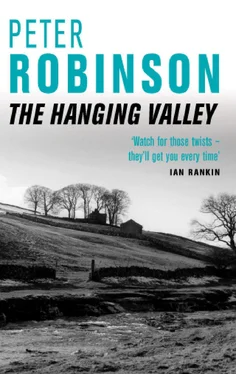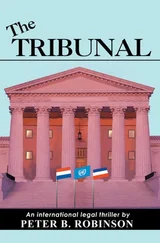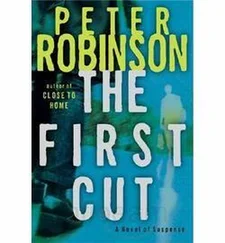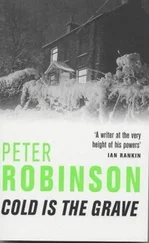‘It could have been an accident,’ Banks said.
‘It warn’t no accident, Mr Banks,’ Mrs Duggan insisted.
‘There was water in the lungs,’ Banks countered weakly.
Mr Duggan snorted. ‘You’d think she were a mermaid, our Cheryl, the way she took to water.’
‘She’d been drinking.’
‘Yes, well, nobody’s saying she was perfect.’
‘Did you ever hear her mention a man by the name of Stephen Collier?’
Mr Duggan shook his head slowly.
There was a sense of defeat about the Duggans that weighed heavily in the dim and stuffy room and made Banks feel sick. Their voices were flat, as if they had repeated their stories a hundred times and nobody had listened; their faces were parchment-dry and drawn, the eyes wide and blank, with plenty of white showing between the lower lashes and the pupils. Dante’s words came into Banks’ mind: ‘Abandon all hope, ye who enter here.’ This was a house of defeat, a place without hope.
Banks lit a cigarette, which would at least give him a more concrete reason to feel sick and dizzy, and went on. ‘The other thing I’d like to know,’ he asked, ‘is if you hired anyone to look into Cheryl’s death. I know you didn’t think much of the police investigation.’
Mr Duggan spat into the grate. His wife frowned at him. ‘Why does it matter?’ she asked.
‘It could be important.’
‘We did hire someone,’ she said. ‘A private investigator from London. We looked him up in the phone book at the library. We were desperate. The police hadn’t done anything for more than a year, and they were saying such terrible things about Cheryl. We took out all our savings.’
‘What happened?’
‘He came from London, this man, and he asked us about Cheryl — who her friends were, where she liked to go out and everything — then he said he’d try and find out what happened.’
‘He never came back,’ Mr Duggan cut in.
‘You mean he ran off with your money?’
‘Not all of it, Alf,’ Mrs Duggan said. ‘Only a retainer, that’s all he’d take.’
‘He took off with the money, Jessie, let’s face it. We were had. He never meant to do anything about our Cheryl; he just took us for what he could get. And we let him.’
‘What was his name?’
‘Don’t remember.’
‘Yes you do, Alf,’ said Mrs Duggan. ‘It was Raymond Addison. I haven’t forgotten.’
‘So what did you do?’
‘What could we do?’ she said. ‘He’d got most of our money, so we couldn’t hire anyone else. The police weren’t interested. We just tried to forget, that’s all.’ She pulled the tartan blanket up higher around her hips.
‘Mr Addison didn’t report back to you at all then, after the first time you saw him?’
‘No,’ Mr Duggan said. ‘We only saw him the once.’
‘Can you remember the date?’
The old man shook his head.
‘I can’t remember the exact day,’ his wife said, ‘but it was in February, about fifteen months after Cheryl was killed. The police seemed to have given up and we didn’t know where to turn. We found him, and he let us down.’
‘If it’s any consolation, Mrs Duggan, I don’t think Mr Addison did let you down.’
‘What?’
‘He was found killed himself, probably no more than a day or so after you saw him, up in Yorkshire. That’s why you never heard from him again, not because he’d run off with your money.’
‘In Yorkshire? What was he doing there?’
‘I think he did find out something about Cheryl’s death. Something the police had missed. You’ve got to understand that we don’t have enough time or men to devote ourselves full time to every single case, Mrs Duggan. I don’t know the circumstances, but maybe the police here weren’t as active as you think they should have been. It’s only in books that policemen find the killer every time. But Mr Addison had only the one case. He must have visited every possible place Cheryl might have been that night, talked to everyone who knew her, and what he found out led him to a village in Yorkshire, and to his death.’
Mrs Duggan bit her knuckles and began to cry silently. Her husband moved forward to comfort her.
‘It never does any good raking up the past,’ he snapped at Banks. ‘Look how you’ve upset her.’
‘I can understand that you’re angry, Mr Duggan,’ Banks said, ‘but if I’m right, then we know who killed your daughter.’
Duggan looked away. ‘What’s it matter now?’
‘Maybe it doesn’t, at least not to you. But I think it ought to mean something that Addison didn’t let you down, didn’t run off with your money. He found a lead, and instead of reporting in he set off while the trail was hot. I think you owe his memory some kind of apology if you’ve been blaming him and thinking ill of him all these years.’
‘Maybe so,’ Duggan admitted. ‘But what use is it now? Two people dead. What use?’
‘More than two,’ Banks said. ‘He had to kill again to cover his tracks. First Addison, then someone else.’
‘All over our Cheryl?’ Mrs Duggan said, wiping her eyes.
Banks nodded. ‘It looks like that’s where it started. Is there anything else you can tell me? Did Cheryl ever talk about anyone at all she knew from Yorkshire? A student she was seeing, perhaps?’
They both shook their heads, then Mrs Duggan laughed bitterly. ‘She said she was going to marry a student one day, a lord’s son, or a prime minister’s. She was very determined, our Cheryl. But she’d too much imagination. She was too flighty. If only she’d done as I said and stuck to her station.’
‘Did she hang around with students much?’
‘She went to the same pubs as they did,’ Mr Duggan said. ‘The police said she was a prostitute, Mr Banks, that she sold herself to men. We didn’t know nothing about that. I still can’t believe it. I know she liked to tart herself up a bit when she went out, but what girl doesn’t? And she wasn’t really old enough to drink, but what can you do…? You can’t keep them prisoners, can you? She was always talking about what fun the students were, how she was sure to meet a nice young man soon. What were we to do? We believed her. Our Cheryl could make you believe she could do anything if she set her mind to it. Every day she woke up with a smile on her face, and that’s no lie. Happiest soul I’ve ever known. What did we do wrong?’
Banks had no answer. He dropped his cigarette in the grate and walked to the door. ‘If you think of anything, let the local police know,’ he said.
‘Wait a minute.’ Mrs Duggan turned to him. ‘Aren’t you going to tell us?’
‘Tell you what?’
‘Who did it. Who killed our Cheryl?’
‘It doesn’t matter now,’ Banks said. ‘It looks like he’s dead himself.’ And he closed the door on their hopelessness and emptiness.
Four
‘I’m sorry, Alan,’ Ted Folley said when he’d heard the story. ‘I told you it wasn’t much of an investigation. We looked into it, but we got nowhere. We were sure the girl drowned. She’d been drinking and there was water in her lungs. The bruises could have been caused by a customer; it’s a rough trade she was in. She didn’t have a ponce, so we’d no one we could jump on right from the start.’
Banks nodded and blew smoke rings. ‘We got nowhere with the Addison case, either,’ he said. ‘There was nothing to link him with Oxford, and we couldn’t find out why he was in Swainshead. Not until now, anyway. What on earth could he have found out?’
‘Anything,’ Folley said. ‘Maybe he found the last pub she’d been in, tracked down a pusher who’d run a mile if he even smelled police.’
‘Was she on drugs?’
‘Not when she died, no. But there had been trouble. Nothing serious, just pills mostly. If Addison trailed around all her haunts and talked to everyone who knew her, showed a photo, flashed a bit of money… You know as well as I do, Alan, these blokes who operate outside the law have a better chance. He must have picked up your man’s name somewhere and set off to question him.’
Читать дальше












